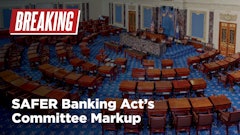
Despite U.S. Sen. Tommy Tuberville, R-Ala., vocally supporting cannabis banking legislation, his reluctance to officially co-sponsor the Secure and Fair Enforcement (SAFE) Banking Act has put him in the crosshairs of prohibitionists and state lawmakers.
In a Sept. 11 letter orchestrated by prohibitionist group Smart Approaches to Marijuana (SAM), signatories urged Tuberville to rescind his support for the legislation. Four members of the state’s Legislature signed the letter as well as Alabama-based medical, drug prevention, law enforcement and faith-based groups.
The letter refers to the SAFE Banking Act as a “backdoor attempt” to legalize cannabis.
“Your support for the SAFE Banking Act is equivalent to supporting the federal legalization of marijuana and would send a dangerous message to young people who look up to you as a role model,” the letter states.
The SAFE Banking Act—legislation that would allow federally regulated financial institutions to work with state-legal cannabis businesses that often are forced to operate in all cash—is finally projected to make headway in the U.S. Senate this Congress after going nowhere in that chamber the past four years, despite seven House passages since 2019.
Notably, Sen. Sherrod Brown, D-Ohio, told Punchbowl News Sept. 4 that the SAFE Banking Act is a top priority on his agenda and that he plans to take up the legislation “in the next six weeks” as the chairman of the Senate Banking Committee.
Senate Majority Leader Chuck Schumer, D-N.Y., also made it clear in a Sept. 1 letter to his colleagues that “safeguarding cannabis banking” is a priority in the remaining months of 2023.
Should the SAFE Banking Act advance from the Senate Banking Committee and eventually move to the Senate floor for a vote, Tuberville’s support would be key to final passage.
Specifically, the legislation has eight Republican senators signed on as co-sponsors. Tuberville’s vote currently represents a ninth and threshold-breaking support metric to avoid a potential filibuster: Nine Republicans plus 51 senators who caucus with the Democratic party equals the 60 votes necessary to limit debate on the floor.
RELATED: SAFE Banking Backed by At Least 9 GOP Senators; Bill Lies Largely in Democrats’ Court
A Tuberville staffer confirmed May 9, 2023, with Cannabis Business Times that the senator supports the SAFE Banking Act. But more than four months later, his name remains absent from the legislation as a co-sponsor.
Tuberville’s vocal support paired with his hesitancy to sign on as a co-sponsor has made him an apparent battleground vote for prohibitionists like SAM, whose Sept. 11 letter was also signed by Concerned Women for America of Alabama, Young Women For America Alabama, Eagle Forum of Alabama, Alabama Pro-life Coalition, and Alabama Citizen Action Program.
In addition, the letter was signed by state Reps. Arnold Mooney and Russell Bedsole, who also serves as captain for the Shelby County Sheriff’s Office. Also, state Sens. April Weaver and Larry Stutts signed the letter.
“This legislation does not deserve your support or co-sponsorship, especially because Alabama will not benefit from its passage,” the letter states. “As you know, our state does not have legal recreational marijuana nor a single open medical marijuana dispensary.”
While Alabama Gov. Kay Ivey signed medical cannabis legislation into law in May 2021, and the state’s Medical Cannabis Coalition awarded 21 licenses in June 2023, the licensing process is currently on hold by Montgomery County Circuit Court Judge James Anderson amid legal challenges to the process.
In the letter to Tuberville, SAM also points out that roughly 800 banks and credit unions currently provide financial services to state-licensed cannabis businesses, as of the first quarter of 2023, according to the Financial Crimes Enforcement Network (FinCEN).
The letter fails to mention that these banks, mostly local and regional operators, aren’t always easily accessible by cannabis operators and that their services carry certain risk factors related to a federally illegal plant that are costly for cannabis businesses compared to accessing traditional banking. Notably, big banks don’t service the cannabis industry because of the plant’s status as a Schedule I drug on the Controlled Substances Act.
“Dispensaries evidently already have access to financial services, and even if the SAFE Banking Act were to pass, they would remain targets for break-ins,” the SAM letter states, suggesting that dispensaries are targets of crime because of the cannabis products they carry rather than the cash-heavy operations that happen within.
Regardless, SAM stands against allowing cannabis retail facilities to offer debit card transactions from big payment processors, like Mastercard, which warned financial firms in July that it is no longer allowing cannabis purchases to be made on debit.
But perhaps SAM’s intentions were made no more clearer than when its CEO, Kevin Sabet, testified on the SAFE Banking Act in May before the Senate Banking Committee. He said he was against the legislation because it would only “further normalize” the cannabis industry.


























